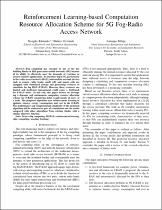 ResearchSpace
ResearchSpace
Reinforcement learning-based computation resource allocation scheme for 5G fog-radio access network
JavaScript is disabled for your browser. Some features of this site may not work without it.
- ResearchSpace
- →
- Research Publications/Outputs
- →
- Conference Publications
- →
- View Item
| dc.contributor.author |
Khumalo, Nosipho N

|
|
| dc.contributor.author |
Oyerinde, O

|
|
| dc.contributor.author |
Mfupe, Luzango P

|
|
| dc.date.accessioned | 2021-01-04T11:29:18Z | |
| dc.date.available | 2021-01-04T11:29:18Z | |
| dc.date.issued | 2020-04 | |
| dc.identifier.citation | Khumalo, N.N, Oyerinde, O and Mfupe, L.P. 2020. Reinforcement learning-based computation resource allocation scheme for 5G fog-radio access network. The Fifth International Conference on Fog and Mobile Edge Computing, Paris, France, 30 June to 3 July 2020, 3pp. | en_US |
| dc.identifier.isbn | 978-1-7281-7216-3 | |
| dc.identifier.isbn | 978-1-7281-7217-0 | |
| dc.identifier.uri | https://ieeexplore.ieee.org/xpl/conhome/9141176/proceeding?pageNumber=3 | |
| dc.identifier.uri | https://ieeexplore.ieee.org/document/9144787 | |
| dc.identifier.uri | http://hdl.handle.net/10204/11699 | |
| dc.description | Copyright: 2020 IEEE. This is the pre-print version of the work. For access to the published version, please access the publisher's website. | en_US |
| dc.description.abstract | Fog computing has emerged as one of the key building blocks of fifth generation mobile networks (5G) because of its ability to effectively meet the demands of real-time or latency-sensitive applications. To introduce fog in 5G, particularly in the radio access network (RAN), intermediate network devices such as remote radio heads, small cells and macro cells are equipped with virtualised storage and processing resources to constitute the fog RAN (F-RAN). However, these resources are limited and inefficient management could cause a bottleneck for F-RAN nodes. To this end, this paper focuses on developing a dynamic and autonomous computing resource allocation scheme for F-RAN considering delay requirements of users at a node. The proposed algorithm uses reinforcement learning to optimise latency, energy consumption and cost in the F-RAN. The performance and computational complexity of the proposed algorithm will be evaluated as part of a simulation and the results compared with other algorithms from existing studies with a similar objective function. | en_US |
| dc.language.iso | en | en_US |
| dc.publisher | IEEE | en_US |
| dc.relation.ispartofseries | Worklist;23979 | |
| dc.subject | Fog computing | en_US |
| dc.subject | 5G RAN | en_US |
| dc.subject | Reinforcement learning | en_US |
| dc.subject | Edge computing | en_US |
| dc.subject | Machine learning | en_US |
| dc.title | Reinforcement learning-based computation resource allocation scheme for 5G fog-radio access network | en_US |
| dc.type | Conference Presentation | en_US |
| dc.identifier.apacitation | Khumalo, N. N., Oyerinde, O., & Mfupe, L. P. (2020). Reinforcement learning-based computation resource allocation scheme for 5G fog-radio access network. IEEE. http://hdl.handle.net/10204/11699 | en_ZA |
| dc.identifier.chicagocitation | Khumalo, Nosipho N, O Oyerinde, and Luzango P Mfupe. "Reinforcement learning-based computation resource allocation scheme for 5G fog-radio access network." (2020): http://hdl.handle.net/10204/11699 | en_ZA |
| dc.identifier.vancouvercitation | Khumalo NN, Oyerinde O, Mfupe LP, Reinforcement learning-based computation resource allocation scheme for 5G fog-radio access network; IEEE; 2020. http://hdl.handle.net/10204/11699 . | en_ZA |
| dc.identifier.ris | TY - Conference Presentation AU - Khumalo, Nosipho N AU - Oyerinde, O AU - Mfupe, Luzango P AB - Fog computing has emerged as one of the key building blocks of fifth generation mobile networks (5G) because of its ability to effectively meet the demands of real-time or latency-sensitive applications. To introduce fog in 5G, particularly in the radio access network (RAN), intermediate network devices such as remote radio heads, small cells and macro cells are equipped with virtualised storage and processing resources to constitute the fog RAN (F-RAN). However, these resources are limited and inefficient management could cause a bottleneck for F-RAN nodes. To this end, this paper focuses on developing a dynamic and autonomous computing resource allocation scheme for F-RAN considering delay requirements of users at a node. The proposed algorithm uses reinforcement learning to optimise latency, energy consumption and cost in the F-RAN. The performance and computational complexity of the proposed algorithm will be evaluated as part of a simulation and the results compared with other algorithms from existing studies with a similar objective function. DA - 2020-04 DB - ResearchSpace DP - CSIR KW - Fog computing KW - 5G RAN KW - Reinforcement learning KW - Edge computing KW - Machine learning LK - https://researchspace.csir.co.za PY - 2020 SM - 978-1-7281-7216-3 SM - 978-1-7281-7217-0 T1 - Reinforcement learning-based computation resource allocation scheme for 5G fog-radio access network TI - Reinforcement learning-based computation resource allocation scheme for 5G fog-radio access network UR - http://hdl.handle.net/10204/11699 ER - | en_ZA |





